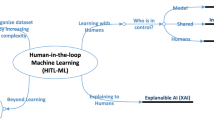Abstract
Learning concepts from examples has been extensively studied during the last few years and several solutions have been proposed. One of the problems that are still open to research is learning concepts withcontext-dependent meaning. This paper presents a method for updating the description of such a concept if its context changes. A case study is also presented.
Similar content being viewed by others
References
Bareiss, E.R., Porter, B.W., and Craig, C.W., Protos: An exemplar-based learning apprentice, in Y. Kodratoff and R.S. Michalski (eds.),Machine Learning: An Artificial Intelligence Approach, Volume III, Morgan-Kaufmann, 1986, pp. 112–127.
Cestnik, B., Kononenko, I., and Bratko, I., ASSISTANT 86: A knowledge elicitation tool for sophisticated users, in I. Bratko and N. Lavrac (eds.),Progress in Machine Learning, Sigma Press, Wilmslow, UK, 1987.
Clearwater, S.H., Cheng, T.P., Hirsh, H., and Buchanan, B.G., Incremental batch learning, inProceedings of the Sixth International Workshop on Machine Learning, Ithaca, New York, June 1989, Morgan Kaufmann, 1989, pp. 366–370.
Cohen, P.R. and Feigenbaum, E.A.,The Handbook of Artificial Intelligence, Volume III, Pitman, London, 1982.
Ferrari, D., A study of load indices for load balancing schemes, in G. Serazzi (ed.),Workload Characterizaton of Computer Systems and Computer Networks, North-Holland, 1986, pp. 91–99.
Fisher, D., Knowledge acquisition via incremental conceptual clustering,Machine Learning 2 (1987), 139–172.
Gennari, J.H., Langley, P., and Fisher, D., Models of incremental concept formation,Artificial Intelligence 40 (1989), 11–61.
Kubat, M., Floating approximation in time-varying knowledge bases,Pattern Recognition Lett. 10 (1989), 223–227.
Kubat, M., A method for performance-oriented self-perception of computers in computer networks, PhD thesis, Department of Computers, Technical University of Brno, September 1989 (in Czech).
Michalski, R.S., Learning flexible concepts: Fundamental ideas and a method based on two-tiered representation, in Y. Kodratoff, R.S. Michalski (eds.):Machine Learning: An Artificial Intelligence Approach, Volume III, Morgan-Kaufmann Publishers, pp. 63–102.
Michalski, R.S. and Larson, J.B., Selection of most representative training examples and incremental generation ofVL1 hypotheses: The underlying methodology and description of programsESEL andAQ11, Report 867, University of Illinois, 1978.
Pawlak, Z., Rough sets,Internat. J. Comput. Information Sci. 11 (1982), 341–356.
Quinlan, J.R., Induction of decision trees,Machine Learning 1 (1986), 81–106.
Quinlan, J.R., Discovery and use of decision trees, Technical Report 326, University of Sydney, 1988.
Utgoff, P.E., Shift of bias for inductive concept learning, in R.S. Michalski, J.G. Carbonell and T.M. Mitchell (eds.),Machine Learning: An Artificial Intelligence Approach, Volume II, Morgan-Kaufmann, 1986, pp. 107–148.
Utgoff, P.E.,ID5: An incrementalID3, inProceedings of the Fifth International Conference on Machine Learning, Ann Arbor, Morgan-Kaufmann, pp. 107–120.
Wong, S.K.M., Ziarko, W., and Ye, R.Li., Comparison of rough-set and statistical methods in inductive learning,Internat. J. Man-Machine Studies 24 (1986), 53–72.
Zadeh, L.A., Fuzzy sets,Information and Control 8 (1965), 338–353.
Zhou, S., An experimental assessment of resource queue lengths as load indices, inProceedings of the 1987 Winter USENIX Conference, Washington DC, 1987, pp. 73–82.
Author information
Authors and Affiliations
Rights and permissions
About this article
Cite this article
Kubat, M. Flexible concept learning in real-time systems. J Intell Robot Syst 8, 155–171 (1993). https://doi.org/10.1007/BF01257993
Received:
Accepted:
Issue Date:
DOI: https://doi.org/10.1007/BF01257993




